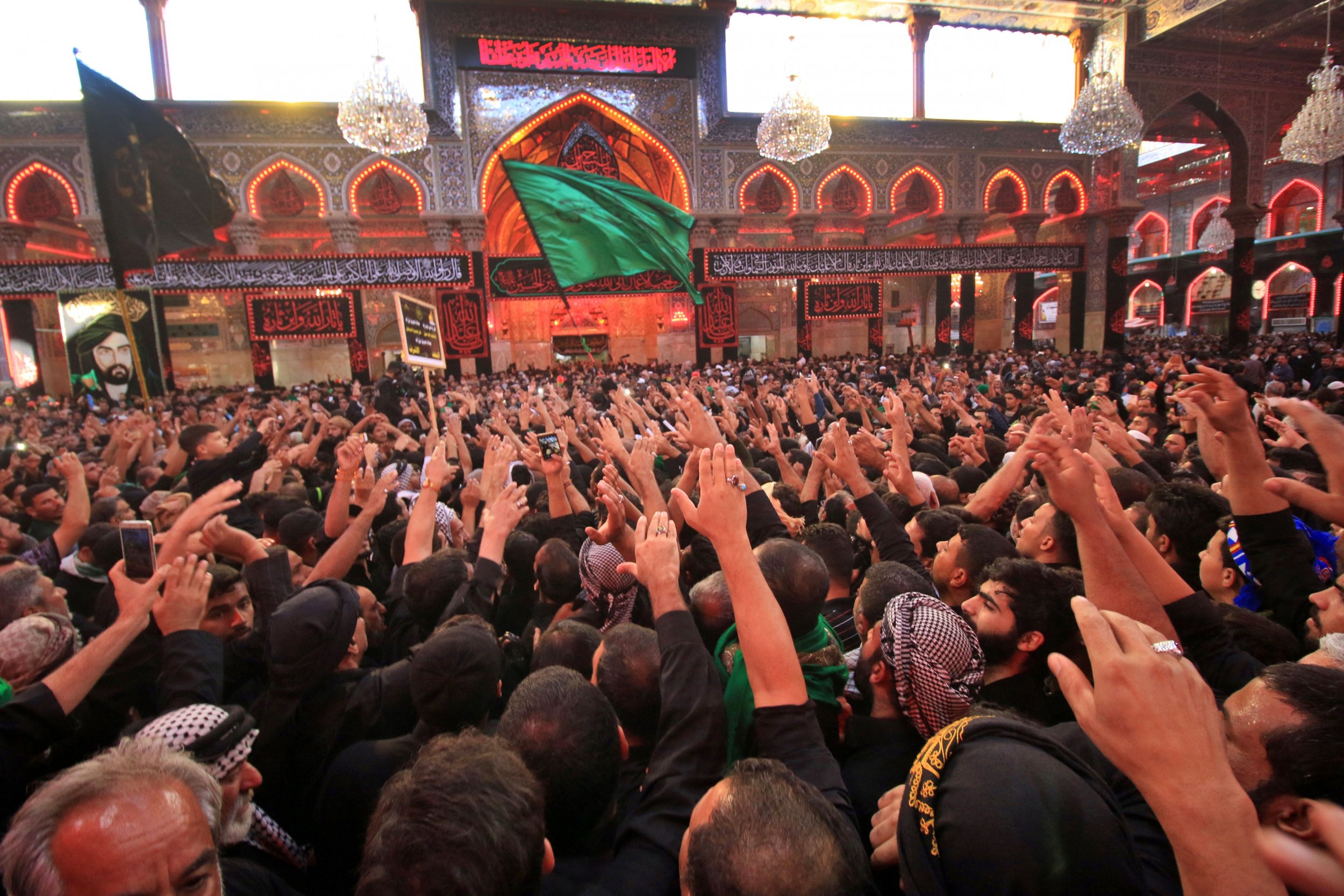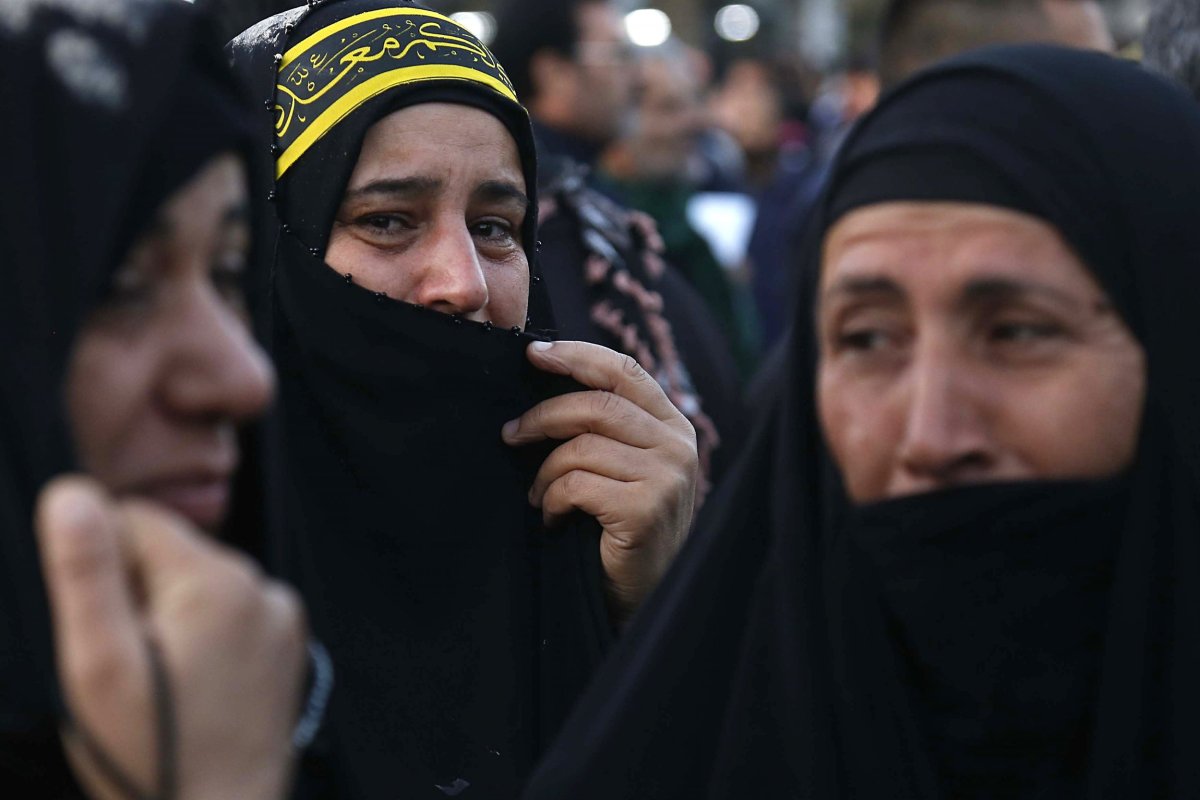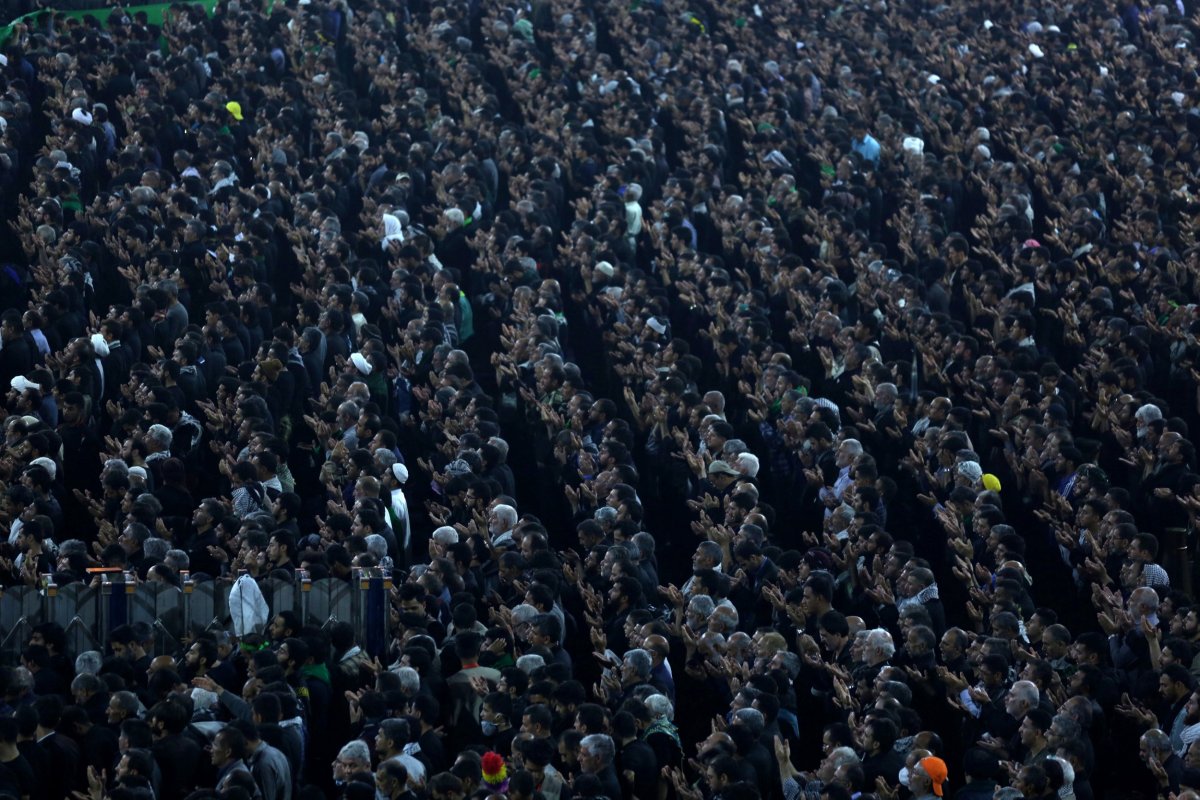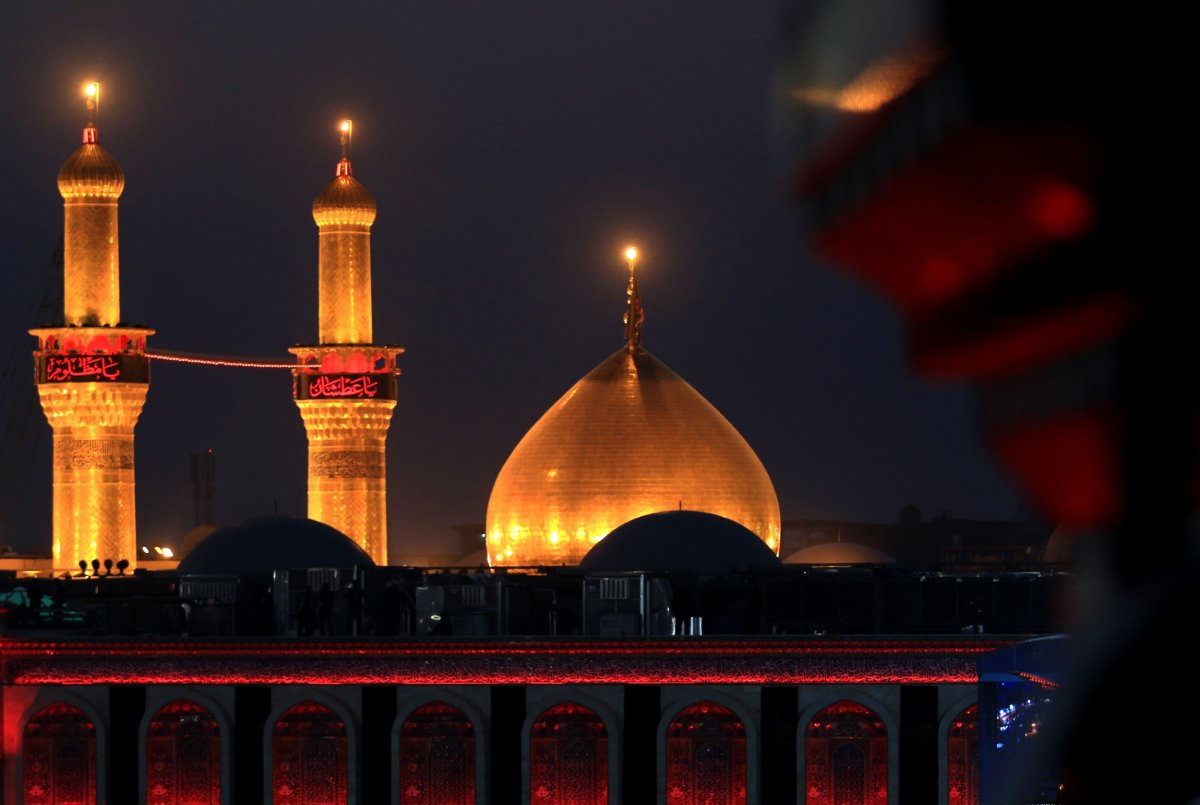
The first pilgrims to rise wake before first light. In the hours before dawn the Shiite faithful return to the roads of southern Iraq, bound for the holy city of Karbala. The frail and the elderly, the young men carrying colored flags of devotion and entire generations of families appear out of the low-hanging mist that shrouds the banks of the Euphrates.
As they come in their millions, the flow of pilgrims meanders across Iraq's highways—principally from Najaf 40 miles to the south or from Baghdad 50 miles to the north. Some walk further to show their dedication by making the journey onfoot for as many as 300 miles from neighboring Kuwait. All of them share the goal of reaching the shrine of Shiite Islam's third Imam, Hussein, for the commemoration of Arbaeen, in remembrance of his death at the battle of Karbala in A.D. 680.
Related: Iran Is the Real Winner In Iraq as the U.S. Coalition Against ISIS Crumbles
The battle between Hussein, the grandson of the Prophet Mohammed, and the forces of the Umayyad Caliph Yazid solidified the rift between Sunni and Shiite Islam that has plagued the Middle East in the centuries since and which, to this day, engulfs the region in sectarian violence.
For Islam's minority Shiites, Hussein's defeat and martyrdom is a history of sacrifice in the face of unassailable odds. In Iraq his death is seen reflected in the losses of the more recent political past: Shiite fighters lost in the fight against the Sunni Islamic State militant group, ISIS, or the years of repression under the Iraqi dictator Saddam Hussein.
While the majority of Karbala's Arbaeen pilgrims are drawn from Iraq, Iran, the republics of central Asia and from the Asian subcontinent, the commemoration draws visitors from across the world. Estimates for the annual number of attendees ranges from six to 20 million individuals, according to different sources.
For Mujahid Abdul-Karim, the Imam of the Masjid al-Rasul Mosque in Watts, Los Angeles, the pilgrimage represents what he describes as "the fulfillment of my spiritual journey." The 72-year-old African American, who travelled some 8,000 miles to reach Karbala from Los Angeles and walked a portion of the last leg of his journey from Najaf, tells Newsweek the experience of coming to Iraq as a Shiite Muslim convert is "overwhelming."
Related: Iran: Israel Will Be 'Eradicated' In Next War With Hezbollah
Abdul-Karim, who played a central role in ending some of the worst gang violence in Watts between the Bloods and the Cripps in the early 1990s, explains the story of Karbala holds a specific relevancy to the experience of African Americans. "We, as African Americans more than any other people can identify with that because we were brought to America in the trans-Atlantic slave trade.
"We were brought to America in slave ships and we were tortured and persecuted for 400 years. Even to this day black people in America are persecuted and deprived of their human rights," he says.

For other American pilgrims Arbaeen offers an opportunity to reconnect spiritually and do charitable works in a country recovering from over a decade of war. Sakina Rizvi, a program officer for an international medical organization based in New York, explains that providing medical care during Arbaeen is part of the commemoration.
Her organization, Imamia Medics International, has been providing medical assistance in Iraq in recent decades, and runs a special program for doctors from around the world to provide care to pilgrims during Arbaeen. Visitors receive treatment for run-of-the-mill problems like coughs and colds, strains and other ailments associated with the walk to Karbala. Other pilgrims are treated for longer-term problems, thanks to the dental, X-ray and other services provided.
Specialist doctors taking part can often be called upon to give more mundane treatments depending on the need. But all do so out of a sense of service. "Part of that medical mission is to help people. You have someone who is a radiologist who will be tending to someone's blisters and he is happy," Rizvi says.
Noor Zaidi, an assistant professor from Maryland who volunteered overnight at one of the medical clinics and saw patients with issues varying from colds to an the onset of a cardiac arrest, said that for some giving medical assistance could be the most fulfilling part of the pilgrimage.
"I think it is always a more meaningful experience than they expect it to be" she says. "It is actually really difficult to get into the shrine and to do the pilgrimage," she added, "but you can still serve the people."

During Arbaeen the streets of Karbala throng with pilgrims all clad in black. Processions setting off towards the shrine dedicated to Hussein are set-pieces of pageantry and mourning. In some, participants don the the seventh-century clothing worn by warriors in the battle between Hussein and Yazid. In others, the faithful flagellate themselves with metal chains to the sounds of devotional music. Many of the processions are organized by international groups—the green Lebanese cedar or the white crescent of Pakistan wave furiously as the devoted pass along the main thoroughfare towards the golden domes of the Imam Hussein Mosque.
Along the roads of the city sit mawquibs. These tented stalls provide a place to sleep and the free food that fuels the pilgrimage. Visitors to the city will queue for shawarma, rice and fava beans or a glass of sugary Iraqi tea at the myriad tents. Those who don't have a house to stay in or a hotel for the night can sleep in one, even if on a mild November night, many stay up praying till dawn, and others simply opt to sleep outside. beneath the stars and the crescents atop the minarets of Karbala's mosques.
Related: Isis Makes Up to $100 Million a Year Smuggling Ancient Artifacts From Iraq and Syria
Just after lunch, one mawquib near the Imam Hussein Shrine is starting its preparations for dinner. Butchered chickens are laid out on trays to be marinaded. Zaid Farad, who brought the outdoor kitchen from Baghdad, and his team of half a dozen volunteer chefs prepare up to 2,000 meals a day over the course of the ten days of Arbaeen.
By 2:00 p.m. the tent which also serves as sleeping quarters, hosts 15 sleeping pilgrims just arrived in Karbala. In one corner lies a group of Iranians. Others have come from Iraq's deep south. For Farad, who has been coming to Arbaeen since the fall of Saddam Hussein in 2003, the memories of the religious festival are bittersweet. His tent is bedecked with pictures of friends and travel companions lost to the fight against the Islamic State. "Everyone has a duty," Farad says. "They have been fighting and we feel honored to be here to serve the pilgrims."

For the Shiite and the outside world, the growing attendance at the Arbaeen has been seen as an analogue for a resurgent Iraq. The country has driven the scourge of ISIS from its towns and cities and for the first time in living memory, the Shiite political class are secure in their preeminence.
Saad al-Deen Hashim, the general manager of the Imam Hussein Mosque, knows as well as most the struggles Iraq's Shiite religious centers have faced in the recent past. Hashim was one of the hundreds of Shiites jailed by the Baath regime through the 1980's Saddam Hussein, a Sunni leader, sought to crush his Shiite opposition through systematic repression. The Arbaeen pilgrimage was banned. Those who trod the road to Karbala hid by the river or trekked across country, under threat of imprisonment.
Hashim says he is proud of the work that has been done in Karbala since the 2003 U.S. invasion ended Saddam's repression. "We are happy because of all the doors of the shrines are open 24 hours each day. We faced many obstacles at the beginning," he says. "Many people were against us and we faced many problems but we proved that we could stand on our own and continue to serve."
Callum Paton travelled to Iraq courtesy of the Shrine Al-Ataba Al-Husayniya in Iraq.
Uncommon Knowledge
Newsweek is committed to challenging conventional wisdom and finding connections in the search for common ground.
Newsweek is committed to challenging conventional wisdom and finding connections in the search for common ground.
About the writer
Callum Paton is a staff writer at Newsweek specializing in North Africa and the Middle East. He has worked freelance ... Read more
To read how Newsweek uses AI as a newsroom tool, Click here.








